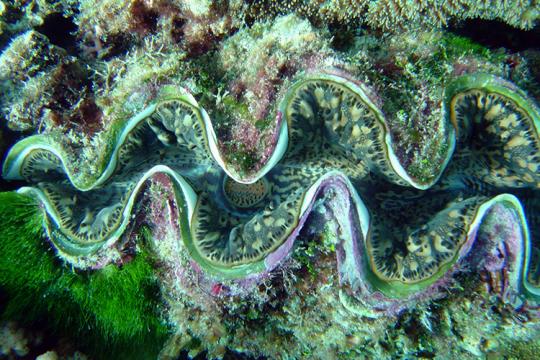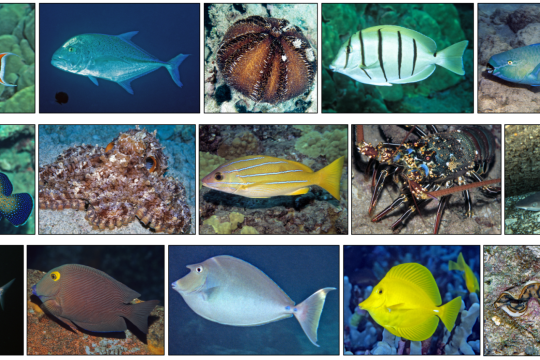Giant Clam (Tridacna spp.)
Tridacna spp.

Protected Status
Quick Facts
 Giant clams. © Doug Helton, WOD submission
Giant clams. © Doug Helton, WOD submission
Giant clams. © Doug Helton, WOD submission
About the Species
 Giant clams. © Doug Helton, WOD submission
Giant clams. © Doug Helton, WOD submission
Giant clams. © Doug Helton, WOD submission
Giant clams are the largest living marine bivalves and typically inhabit tropical coral reefs in coastal regions throughout the Indo-Pacific Ocean. Giant clams are members of the Subfamily Tridacninae, which consists of two genera: Hippopus and Tridacna.
Currently, seven giant clam species are candidate species for listing under the Endangered Species Act. This includes two species in the genus Hippopus (H. hippopus and H. porcellanus) and five species in the genus Tridacna (T. derasa, T. gigas, T. mbalavuana (tevoroa), T. squamosa, and T. squamosina (costata).
Scientific Classification
| Kingdom | Animalia | Phylum | Mollusca | Class | Bivalvia | Order | Cardiida | Family | Cardiidae | Genus | Tridacna | Species |
|---|
Last updated by NOAA Fisheries on 07/24/2024
Featured News
 A grant project in Guam is setting up giant clam aquaculture in two southern villages, Inalåhan and Malesso. Giant clams are a culturally important species in Guam, where they’re also regulated due to overharvesting. Credit: David Burdick
A grant project in Guam is setting up giant clam aquaculture in two southern villages, Inalåhan and Malesso. Giant clams are a culturally important species in Guam, where they’re also regulated due to overharvesting. Credit: David Burdick
 Fifteen of the 83 species included in the Pacific Islands vulnerability assessment. From left to right: Acanthurus achilles, Caranx melampygus, Tripneustes gratilla, Acanthurus triostegus, Scarus rubroviolaceus, Cephalopholis argus, Octopus cyanea, Lutjanus kasmira, Panulirus penicillatus, Triaenodon obesus, Selar crumenophthalmus, Ctenochaetus strigosus, Naso unicornis, Zebrasoma flavescens, Tridacna maxima. Photo credit: Bruce Mundy.
Fifteen of the 83 species included in the Pacific Islands vulnerability assessment. From left to right: Acanthurus achilles, Caranx melampygus, Tripneustes gratilla, Acanthurus triostegus, Scarus rubroviolaceus, Cephalopholis argus, Octopus cyanea, Lutjanus kasmira, Panulirus penicillatus, Triaenodon obesus, Selar crumenophthalmus, Ctenochaetus strigosus, Naso unicornis, Zebrasoma flavescens, Tridacna maxima. Photo credit: Bruce Mundy.
Management Overview
Currently, seven giant clam species are candidate species for listing under the Endangered Species Act. This includes two species in the genus Hippopus (H. hippopus and H. porcellanus) and five species in the genus Tridacna (T. derasa, T. gigas, T. mbalavuana (tevoroa), T. squamosa, and T. squamosina (costata).
Regulatory History
In 2016, we were petitioned to list 10 species of giant clam as endangered or threatened under the ESA.
We reviewed the petition and determined that a status review should be conducted for Tridacna derasa, Tridacna gigas, Tridacna mbalavuana, Tridacna squamosa, and Tridacna squamosina. A status review is currently underway.
Last updated by NOAA Fisheries on 07/24/2024
